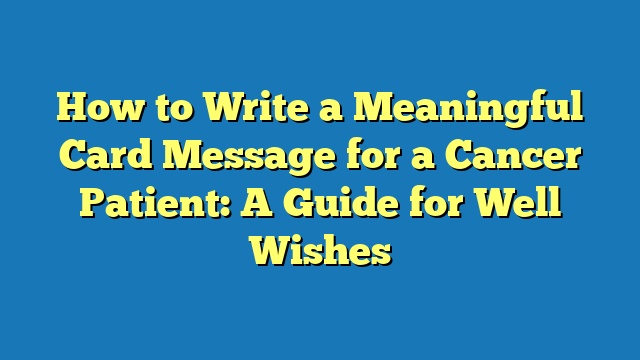A card message for a cancer patient is a heartfelt expression of support and encouragement offered through a written note or card. It provides a thoughtful way to convey well wishes, share uplifting words, and acknowledge the patient’s journey with compassion.
Card messages for cancer patients offer a crucial source of comfort and inspiration during a challenging time. They can help patients feel supported, boost their morale, and alleviate feelings of isolation. Historically, written messages have played a significant role in connecting people across distances, providing a tangible expression of care.
This article will explore the importance of card messages for cancer patients, discuss their benefits, and delve into the historical and cultural significance of supportive communication in times of need.
Card Message for Cancer Patient
A card message for a cancer patient is a crucial form of support and encouragement during a challenging time. Its key aspects encompass various dimensions, including:
- Emotional support
- Expression of care
- Conveyance of hope
- Acknowledgement of journey
- Distraction from challenges
- Connection to loved ones
- Inspiration for strength
- Legacy of love
These aspects play a vital role in providing comfort, upliftment, and a sense of community for cancer patients. Card messages can serve as a tangible reminder of the love, support, and well wishes that surround them.
Emotional support
Emotional support is a critical component of a card message for a cancer patient. A cancer diagnosis can be a deeply emotional experience, leading to feelings of fear, sadness, anger, and uncertainty. A well-crafted card message can provide much-needed emotional support by acknowledging these feelings and offering words of comfort and encouragement.
Real-life examples of emotional support in card messages for cancer patients include:
- “I’m so sorry to hear about your diagnosis. I want you to know that I’m here for you every step of the way.”
- “I know this is a difficult time, but I believe in your strength. You’re a fighter, and I’m here to support you in any way I can.”
- “I’m sending you all my love and positive thoughts. Please know that you’re not alone in this journey.”
The practical significance of emotional support in card messages for cancer patients is immense. Emotional support can help patients feel less isolated and alone, improve their mood, and boost their overall well-being. Card messages can serve as a tangible reminder that the patient is loved, cared for, and supported by their community.
Expression of care
Expression of care is a crucial component of a card message for a cancer patient. Cancer can be an isolating and emotionally challenging experience, and a card message can serve as a powerful expression of love, support, and care.
Real-life examples of expressions of care in card messages for cancer patients include:
- “I’m thinking of you during this difficult time. Please know that you’re not alone and that I’m here for you.”
- “I’m so proud of the strength and courage you’ve shown throughout this journey. You’re an inspiration to us all.”
- “I wanted to let you know that I’m here to help in any way I can, whether it’s running errands, providing a listening ear, or just being a shoulder to cry on.”
The practical significance of expressing care in card messages for cancer patients is immense. Expressions of care can help patients feel loved, supported, and less alone. They can also provide a sense of hope and encouragement, and remind patients that they are surrounded by people who care about them.
Conveyance of hope
Conveyance of hope is a critical component of a card message for a cancer patient. Cancer can be a daunting and uncertain experience, and a card message can serve as a beacon of hope and encouragement.
Real-life examples of conveyance of hope in card messages for cancer patients include:
- “I know this is a difficult time, but I want you to know that I believe in you. You have the strength to overcome this.”
- “I’m sending you all my positive thoughts and prayers. I know you can get through this.”
- “I’m here for you every step of the way. Together, we’ll get through this.”
The practical significance of conveying hope in card messages for cancer patients is immense. Hope can provide patients with the strength to face their challenges, boost their morale, and improve their overall well-being. Card messages can serve as a tangible reminder that the patient is not alone and that there are people who believe in them and their ability to overcome.
Acknowledgement of journey
Acknowledgement of journey is a crucial aspect of a card message for a cancer patient. It involves recognizing the patient’s unique experiences, challenges, and triumphs throughout their cancer journey. This acknowledgement can provide comfort, support, and a sense of validation.
-
Recognition of emotions
Acknowledge the range of emotions that the patient may be experiencing, including fear, sadness, anger, and hope. Let them know that it is okay to feel these emotions and that you are there to support them.
-
Validation of experiences
Recognize the patient’s individual experiences and challenges. Let them know that you understand what they are going through and that their experiences are valid.
-
Celebration of milestones
Acknowledge the patient’s milestones and victories, both big and small. This can help them feel a sense of progress and accomplishment.
-
Respect for decisions
Acknowledge the patient’s right to make decisions about their own care. Let them know that you respect their choices and will support them in whatever they decide.
Acknowledgement of journey is a powerful way to show cancer patients that you care about them and that you are there to support them every step of the way. It can help them feel less alone and more connected to the people around them.
Distraction from challenges
Card messages for cancer patients can provide a much-needed distraction from the challenges and difficulties of cancer treatment. When patients are focused on something positive and uplifting, they may be less likely to dwell on their worries and fears. This can help them to cope with the emotional and physical challenges of cancer and to maintain a more positive outlook.
Real-life examples of “distraction from challenges” in card messages for cancer patients include:
- “I know this is a difficult time, so I wanted to send you a little something to make you smile.”
- “I’m thinking of you and sending you all my positive thoughts. I hope this card brings you a little bit of joy.”
- “I know you’re going through a lot right now, so I wanted to send you this card to let you know that I’m here for you.”
The practical significance of providing distraction from challenges in card messages for cancer patients is immense. Distraction can help patients to cope with the emotional and physical challenges of cancer, maintain a more positive outlook, and improve their overall well-being.
Connection to loved ones
For cancer patients, connection to loved ones is of paramount importance, providing emotional support, a sense of belonging, and a reminder that they are not alone in their journey.
-
Emotional Support
Card messages can offer emotional support by expressing love, care, and encouragement. They can help patients feel understood, valued, and less isolated during a challenging time.
-
Sense of Belonging
Messages from loved ones can create a sense of belonging and community for cancer patients. Knowing that they are surrounded by people who care about them can boost their morale and help them feel connected to the outside world.
-
Reminder of Love
Card messages serve as tangible reminders of the love and support that cancer patients have from their loved ones. They can provide comfort and reassurance, especially during difficult moments.
-
Hope and Inspiration
Messages from loved ones can offer hope and inspiration to cancer patients. They can remind patients of their strength, resilience, and ability to overcome challenges.
Overall, connection to loved ones is a crucial aspect of card messages for cancer patients. It provides emotional support, a sense of belonging, a reminder of love, and hope during a challenging time.
Inspiration for strength
In the realm of card messages for cancer patients, inspiration for strength plays a pivotal role. It serves as a beacon of hope, encouraging patients to tap into their inner resilience and face challenges with unwavering determination.
-
Affirmations of Strength
Card messages can offer powerful affirmations of strength, reminding patients of their innate capabilities and the belief that they possess the fortitude to overcome obstacles.
-
Stories of Courage
Sharing stories of courage and resilience from others who have faced similar challenges can inspire patients, demonstrating that they are not alone and that hope prevails.
-
Quotes and Sayings
Inspirational quotes and sayings can provide a source of wisdom and motivation, reminding patients of the strength within themselves and the power of perseverance.
-
Personal Anecdotes
Incorporating personal anecdotes about the patient’s own strength and resilience can serve as a powerful reminder of their capacity to overcome challenges.
By providing inspiration for strength, card messages for cancer patients can help foster a mindset of resilience, boost morale, and empower patients to navigate their journey with courage and determination.
Legacy of love
Within the realm of card messages for cancer patients, “legacy of love” stands as a profound and multifaceted concept. It encompasses the enduring expressions of affection, support, and well wishes that transcend the physical presence of the sender and create a lasting impact on the recipient’s life.
-
Tangible reminders of love
Card messages serve as tangible reminders of the love and care that surround cancer patients. They can be treasured and revisited, providing comfort and reassurance during difficult times.
-
Expressions of hope and encouragement
Through heartfelt words of encouragement and expressions of hope, card messages offer a beacon of light, reminding patients of their strength and resilience.
-
Connection to loved ones
Card messages bridge the physical distance between cancer patients and their loved ones, creating a sense of connection and belonging.
-
Source of inspiration
Messages of love and support can inspire cancer patients to face challenges with courage and determination, knowing that they are not alone in their journey.
Collectively, these facets of “legacy of love” woven into card messages for cancer patients create a powerful tapestry of support, empowerment, and enduring connection that extends beyond the present moment, leaving a lasting legacy of love and care.
FAQs on Card Messages for Cancer Patients
This section provides answers to frequently asked questions and clarifies essential aspects of card messages for cancer patients.
Question 1: What is the significance of sending card messages to cancer patients?
Answer: Card messages offer emotional support, express care and hope, acknowledge the patient’s journey, provide a distraction from challenges, foster connection with loved ones, inspire strength, and create a lasting legacy of love.
Question 2: What are some key elements to include in a card message for a cancer patient?
Answer: Key elements include expressions of love and support, words of encouragement and hope, recognition of the patient’s experiences, and a reminder that they are not alone.
Question 3: How can card messages help cancer patients cope with their emotions?
Answer: Card messages can provide emotional support by validating the patient’s feelings, offering a safe space to express emotions, and reminding them that others care about their well-being.
Question 4: What are some appropriate topics to discuss in a card message for a cancer patient?
Answer: Appropriate topics include sharing memories, expressing gratitude for their strength, offering practical support, or simply letting them know you are thinking of them.
Question 5: How often should I send card messages to a cancer patient?
Answer: The frequency of sending card messages can vary depending on the patient’s preferences and needs. It is generally thoughtful to send messages regularly, such as weekly or bi-weekly, but it is essential to respect the patient’s space and avoid overwhelming them.
Question 6: Can card messages make a difference in the life of a cancer patient?
Answer: Yes, card messages can make a significant difference by providing emotional support, encouragement, and a sense of connection. They can help patients feel less alone, boost their morale, and remind them that they are loved and cared for.
These FAQs provide insights into the importance and impact of card messages for cancer patients. They highlight the various ways in which card messages can offer support and comfort during a challenging time. Moving forward, we will explore additional aspects related to card messages for cancer patients, including tips for writing effective messages and suggestions for sending messages in different situations.
Tips for Writing Card Messages for Cancer Patients
When crafting card messages for cancer patients, it is essential to approach the task with sensitivity and thoughtfulness. Here are eight tips to help you write meaningful and supportive messages:
Tip 1: Express genuine care and support. Let the patient know that you care about them and are there for them during this challenging time.
Tip 2: Acknowledge their journey. Recognize the patient’s strength and resilience in facing cancer. Let them know that you understand what they are going through.
Tip 3: Offer specific words of encouragement. Avoid generic phrases and instead offer specific words of hope and encouragement tailored to the patient’s situation.
Tip 4: Share positive thoughts and experiences. If appropriate, share positive thoughts or experiences that may inspire or uplift the patient.
Tip 5: Respect their space and boundaries. Let the patient know that you are there for them whenever they need you, but respect their need for space and privacy.
Tip 6: Use uplifting language. Choose words that are positive, hopeful, and supportive. Avoid using clichs or overly sentimental language.
Tip 7: Offer practical support. If possible, offer specific ways in which you can help, such as running errands, providing meals, or simply lending an ear.
Tip 8: Keep it personal and heartfelt. Let the patient know that your message comes from the heart. Share personal anecdotes or memories that may resonate with them.
By following these tips, you can create card messages that provide comfort, support, and encouragement to cancer patients during their challenging journey.
As we conclude this section on tips for writing card messages for cancer patients, it is important to remember that the most valuable aspect of these messages is the genuine care and compassion they convey. By taking the time to craft thoughtful and meaningful words, you can make a positive impact on the life of a cancer patient.
Conclusion
Throughout this article, we have explored the multifaceted significance of card messages for cancer patients. These messages serve as beacons of support, encouragement, and love, providing emotional comfort and a sense of connection during a challenging time. By acknowledging the patient’s journey, offering specific words of hope, and using uplifting language, card messages can make a profound impact on the lives of cancer patients.
Key ideas that emerge from our exploration include the importance of expressing genuine care and understanding, the power of specific and heartfelt messages, and the need to respect the patient’s space and boundaries. These principles guide the creation of meaningful card messages that provide solace and support to those facing cancer.
As we reflect on the insights gained, let us remember that card messages for cancer patients are more than just words on paper; they are tangible expressions of love, hope, and solidarity. By taking the time to craft thoughtful and compassionate messages, we can make a real difference in the lives of those who need it most.








